
Wallace Fitzgerald Beery was an American film and stage actor. He is best known for his portrayal of Bill in Min and Bill (1930) opposite Marie Dressler, as General Director Preysing in Grand Hotel (1932), as Long John Silver in Treasure Island (1934), as Pancho Villa in Viva Villa! (1934), and his title role in The Champ (1931), for which he won the Academy Award for Best Actor. Beery appeared in some 250 films during a 36-year career. His contract with Metro-Goldwyn-Mayer stipulated in 1932 that he would be paid $1 more than any other contract player at the studio. This made Beery the highest-paid film actor in the world during the early 1930s. He was the brother of actor Noah Beery and uncle of actor Noah Beery Jr.

Florence Davenport Rice was an American film actress.
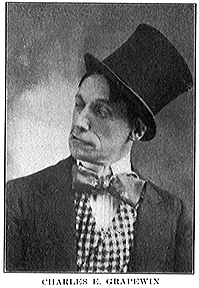
Charles Ellsworth Grapewin was an American vaudeville and circus performer, a writer, and a stage and film actor. He worked in over 100 motion pictures during the silent and sound eras, most notably portraying Uncle Henry in Metro-Goldwyn-Mayer's The Wizard of Oz (1939), "Grandpa" William James Joad in The Grapes of Wrath (1940), Jeeter Lester in Tobacco Road (1941), Uncle Salters in Captains Courageous (1937), Gramp Maple in The Petrified Forest (1936), Wang's Father in The Good Earth (1937), and California Joe in They Died With Their Boots On (1941).

Noah Nicholas Beery was an American actor who appeared in films from 1913 until his death in 1946. He was the older brother of Academy Award-winning actor Wallace Beery as well as the father of prominent character actor Noah Beery Jr. He was billed as either Noah Beery or Noah Beery Sr. depending upon the film.

Helen Broderick was an American actress known for her comic roles, especially as a wisecracking sidekick.
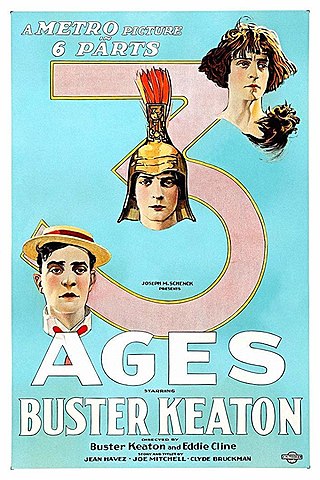
Three Ages is a 1923 black-and-white American feature-length silent comedy film starring comedian Buster Keaton and Wallace Beery. The first feature Keaton wrote, directed, produced, and starred in, Keaton structured the film like three inter-cut short films. While Keaton was a proven success in the short film medium, he had yet to prove himself as a feature-length star. It has been alleged that, had the project flopped, the film would have been broken into three short films, although this has been disputed by film historians who note that neither Keaton nor his associates made this claim in their lifetimes.The structure also worked as a parody of D. W. Griffith's 1916 film Intolerance.

The Bad Man of Brimstone is a 1937 American Western film directed by J. Walter Ruben and starring Wallace Beery, Virginia Bruce and Dennis O'Keefe. The screenplay was written by Cyril Hume and Richard Maibaum, from a story by Ruben and Maurice Rapf.
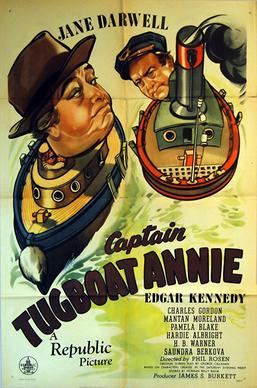
Captain Tugboat Annie is a 1945 second sequel to the classic Tugboat Annie (1933), this time starring Jane Darwell as Annie and Edgar Kennedy as Horatio Bullwinkle. The film was directed by Phil Rosen, and is also known as Tugboat Annie's Son.
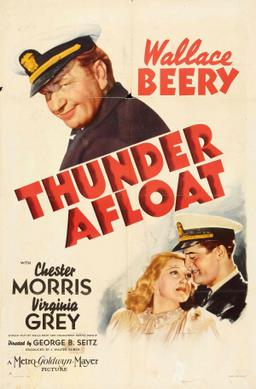
Thunder Afloat is a 1939 World War I naval film starring Wallace Beery and Chester Morris. The movie was directed by George B. Seitz.

Barnacle Bill is a 1941 American comedy drama film starring Wallace Beery. The screen comedy was directed by Richard Thorpe. Barnacle Bill was the second of seven MGM films pairing Beery and character actress Marjorie Main.

Salute to the Marines is a 1943 World War II war film drama in Technicolor from MGM, produced by John W. Considine Jr., directed by S. Sylvan Simon, and starring Wallace Beery. The film co-stars Fay Bainter, Reginald Owen, Ray Collins, Keye Luke, and Marilyn Maxwell. Beery's older brother Noah Beery, Sr. also appears in the film, which is set in the Philippines just prior to the beginning of the Pacific War.
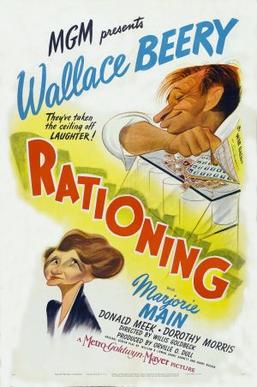
Rationing is a 1944 American comedy film about governmental restrictions on the sale of food, fuel, and other consumer items and services in the United States during World War II. Directed by Willis Goldbeck and distributed by Metro-Goldwyn-Mayer, the production stars Wallace Beery and features Marjorie Main.

As Thousands Cheer is a revue with a book by Moss Hart and music and lyrics by Irving Berlin, first performed in 1933. The revue contained satirical sketches and witty or poignant musical numbers, several of which became standards, including "Heat Wave", "Easter Parade" and "Harlem on my Mind". The sketches were loosely based on the news and the lives and affairs of the rich and famous, as well as other prominent personalities of the day, such as Joan Crawford, John D. Rockefeller Jr., Noël Coward, Josephine Baker, and Aimee Semple McPherson.

Beauty for Sale is a 1933 American pre-Code film about the romantic entanglements of three beauty salon employees. Based on the 1933 novel Beauty by Faith Baldwin, it stars Madge Evans, Alice Brady, Otto Kruger and Una Merkel.

Ah, Wilderness! is a 1935 American comedy-drama film adaptation of the 1933 Eugene O'Neill play of the same name. Directed by Clarence Brown, the film stars Wallace Beery and features Lionel Barrymore, Eric Linden, Cecilia Parker, Spring Byington, and a young Mickey Rooney. Rooney stars as Richard in MGM's musical remake Summer Holiday (1948).

Look Homeward, Angel is a 1957 stage play by the playwright Ketti Frings. The play is based on Thomas Wolfe's 1929 largely autobiographical novel of the same title.
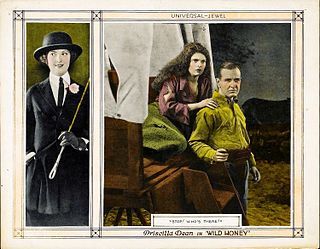
Wild Honey is a 1922 American silent romantic adventure film directed by Wesley Ruggles. Produced and distributed by the Universal Film Manufacturing Company, the film is based on a book of the same title by Cynthia Stockley and stars Priscilla Dean, and features Noah Beery, Sr. and Wallace Beery in supporting roles. It is notable for the first use of a traveling matte special effect.

Hell and High Water is a 1933 American Pre-Code drama film directed by Grover Jones and William Slavens McNutt and written by Grover Jones, Agnes Brand Leahy, William Slavens McNutt and Max Miller. The film stars Richard Arlen, Judith Allen, Charley Grapewin, Gertrude Hoffman, Guy Standing, and William Frawley. The film was released on October 27, 1933, by Paramount Pictures.
A Man Four-Square is a lost 1926 American silent Western film directed by Roy William Neill and starring Buck Jones, Marion Harlan, and Harry Woods.
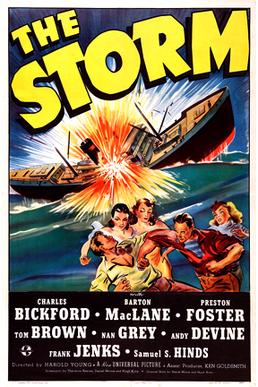
The Storm is a 1938 American action film directed by Harold Young and written by Theodore Reeves, Daniel Moore and Hugh King. The film stars Charles Bickford, Barton MacLane, Preston Foster, Tom Brown, Nan Grey, Andy Devine, Frank Jenks and Samuel S. Hinds. The film was released on October 28, 1938, by Universal Pictures.




















